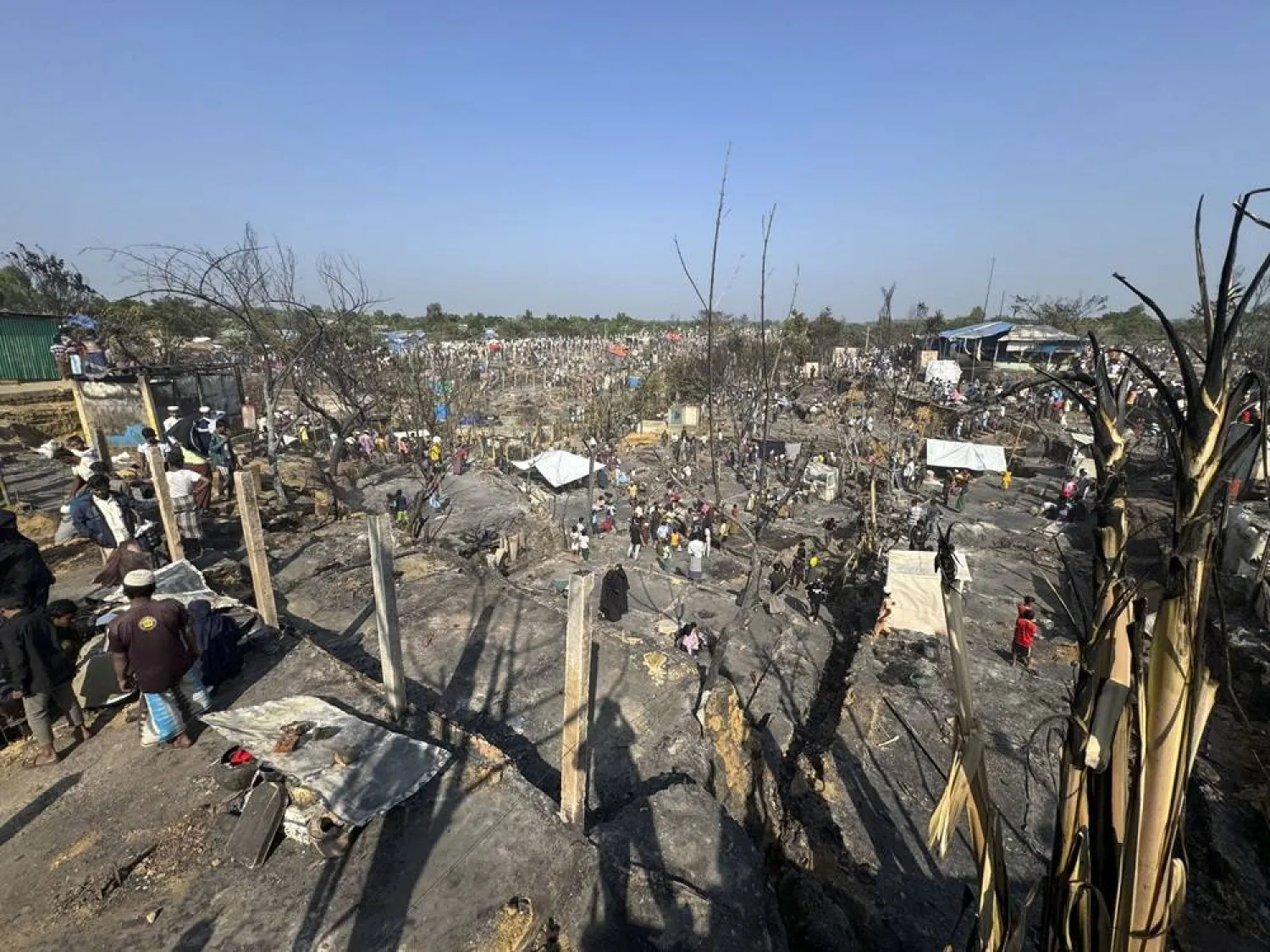Across a treacherous stretch of water, the Rohingya came by the thousands, then died by the hundreds. And though they know the dangers of fleeing by boat, many among this persecuted people say they will not stop — because the world has left them with no other choice.
Last year, nearly 4,500 Rohingya — two-thirds of them women and children — fled their homeland of Myanmar and the refugee camps in neighboring Bangladesh by boat, the United Nations’ refugee agency reported. Of those, 569 died or went missing while crossing the Bay of Bengal and Andaman Sea, the highest death toll since 2014, The Associated Press said.
The numbers mean one out of every eight Rohingya who attempted the crossing never made it, the United Nations High Commissioner for Refugees said last week.
Yet despite the risks, there are no signs the Rohingya will stop. On Thursday, Indonesian officials said another boat carrying Rohingya refugees landed in the country’s northern province of Aceh.
Fishermen provided food and water to 131 Rohingya, mostly women and children, who had been on board, said Marzuki, the leader of the local tribal fishing community, who like many Indonesians goes by one name.
Some passengers told officials they had been at sea for weeks and their boat's engine had broken down, leaving them adrift, said Lt. Col. Andi Susanto, commander of the navy base in Lhokseumawe.
“Southeast Asian waters are one of the deadliest stretches in the world and a graveyard for many Rohingya who have lost their lives,” says Babar Baloch, UNHCR’s spokesperson for Asia and the Pacific. “The rate of Rohingya who are dying at sea without being rescued — that’s really alarming and worrying.”
Inside the squalid refugee camps in Bangladesh, where more than 750,000 ethnic Rohingya Muslims fled in 2017 following sweeping attacks by Myanmar’s military, the situation has grown increasingly desperate. Not even the threat of death at sea is enough to stop many from trying to traverse the region’s waters in a bid to reach Indonesia or Malaysia.
“We need to choose the risky journey by boat because the international community has failed their responsibility,” says Mohammed Ayub, who is saving up money for a spot on one of the rickety wooden fishing boats traffickers use to ferry passengers 1,800 kilometers (1,100 miles) from Bangladesh to Indonesia.
Global indifference toward the Rohingya crisis has left those languishing in the overcrowded camps with few alternatives to fleeing. Because Bangladesh bans the Rohingya from working, their survival is dependent upon food rations, which were slashed last year due to a drop in global donations.
Returning safely to Myanmar is virtually impossible for the Rohingya, because the military that attacked them overthrew Myanmar’s democratically elected government in 2021. And no country is offering the Rohingya any large-scale resettlement opportunities.
Meanwhile, a surge in killings, kidnappings and arson attacks by militant groups in the camps has left residents fearing for their lives. And so, starving, scared and out of options, they continue to board the boats.
Ayub has lived in a sweltering, cramped shelter for more than six years in a camp where security and sanitation are scarce, and hope even scarcer. There is no formal schooling for his children, no way for him to earn money, no prospects for returning to his homeland and no refuge for his family amid spiraling gang violence.
“Of course I understand how dangerous the boat journey by sea is,” Ayub says. “We could die during the journey by boat. But it depends on our fate. ... It’s better to choose the dangerous way even if it’s risky, because we are afraid to stay in the camps.”
Two hundred of the people who died or went missing at sea last year were aboard one boat that left Bangladesh in November. Eyewitnesses on a nearby boat told The Associated Press that the missing vessel, which was crowded with babies, children and mothers, broke down and was taking on water before it drifted off during a storm as its passengers screamed for help. It has not been seen since.
It was one of several distressed boats that the region’s coastal countries neglected to save, despite the United Nations refugee agency's requests for those countries to launch search and rescue missions.
“When no action is taken, lives are lost,” says UNHCR’s Baloch. “If there is no hope restored in Rohingya lives either in Myanmar or in Bangladesh, there are no rescue attempts, (then) sadly we could see more desperate people dying in Southeast Asian seas under the watch of coastal authorities who could act to save lives.”
Six of Mohammed Taher’s family members were aboard the boat that vanished in November, including his 15-year-old brother, Mohammed Amin, and two of Taher’s nephews, ages 3 and 4. Their ultimate destination was Malaysia, a Muslim-majority country where many Rohingya seek relative safety.
Taher and his parents now struggle to sleep or eat, and spend their days agonizing over what became of their loved ones. Taher’s mother saw a fortune teller who said her relatives were still alive. Taher, meanwhile, dreamed that the boat made it to shore, where his relatives took refuge in a school and were able to bathe in warm water. But he remains unconvinced their journey ended so happily.
And so he has vowed to tell everyone to stay off the boats, no matter how unbearable life on land has become.
“I will never leave by boat on this difficult journey,” Taher says. “All the people who reached their destination are saying that it’s horrific traveling by boat.”
Yet such warnings are often futile. Ayub is now preparing to sell his daughter’s jewelry to help pay for his spot on a boat. While he is frightened by the stories of those who didn’t make it, he is motivated by the stories of those who did.
“Nobody would consider taking a risk by boat on a dangerous journey if they had better opportunities,” he says. “Fortunately, some people did reach their destination and got a better life. I am staying positive that Allah will save us.”
Out of Options, Rohingya are Fleeing Myanmar and Bangladesh by Boat Despite Soaring Death Toll

Rohingya refugees look on after a midnight fire raced through their refugee camp at Kutupalong in Cox's Bazar district, Bangladesh, Sunday, Jan. 7, 2024. (AP)

Out of Options, Rohingya are Fleeing Myanmar and Bangladesh by Boat Despite Soaring Death Toll

Rohingya refugees look on after a midnight fire raced through their refugee camp at Kutupalong in Cox's Bazar district, Bangladesh, Sunday, Jan. 7, 2024. (AP)
لم تشترك بعد
انشئ حساباً خاصاً بك لتحصل على أخبار مخصصة لك ولتتمتع بخاصية حفظ المقالات وتتلقى نشراتنا البريدية المتنوعة







